What We Learned From the 2022 Vuelta a España
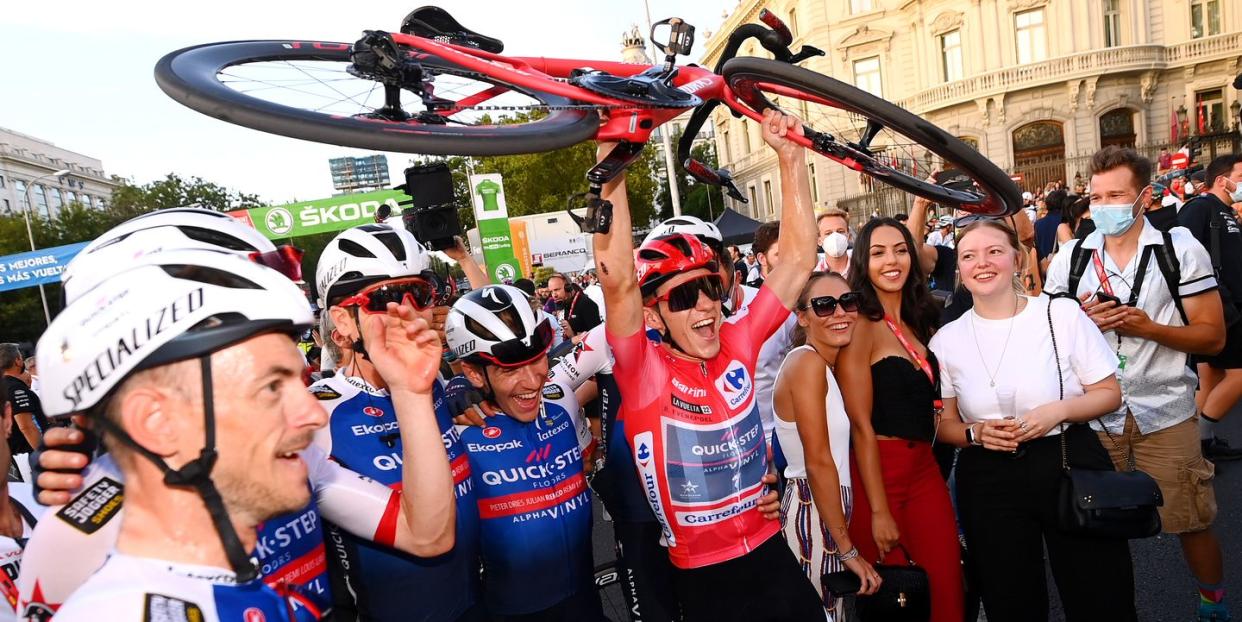
- Oops!Something went wrong.Please try again later.
- Oops!Something went wrong.Please try again later.
Belgium’s Remco Evenepoel (Quick-Step Alpha Vinyl) held on to win the Tour of Spain, ending his nation’s 44-year grand tour drought.
The 2022 Tour of Spain (known locally as the “Vuelta a España”) wrapped up in Madrid on Sunday with Belgium’s Remco Evenepoel (Quick-Step Alpha Vinyl) taking the victory. Here’s a quick rundown of what went down during the Vuelta’s final week–and a quick look at what’s to come as the season approaches its final weeks.
Who’s Won?
Belgium’s Remco Evenepoel (Quick-Step Alpha Vinyl) has won the 2022 Tour of Spain. Riding in only the second grand tour of his career, the 22-year-old took the red jersey as the leader of the Vuelta’ General Classification on Stage 5 and defended the jersey all the way to the finish in Madrid, winning two stages along the way. Spaniards Enric Mas (Movistar) and Juan Ayuso (UAE Team Emirates) finished second and third at 2:02 and 4:57, respectively.
Denmark’s Mads Pedersen (Trek-Segafredo) won three stages and the green jersey as the winner of the Vuelta’s Points Classification, and Ecuador's Richard Carapaz (INEOS Grenadiers) won three stages on his way to winning the polka dot jersey as the winner of the Vuelta’s King of the Mountains Classification. Evenepoel was the Vuelta’s Best Young Rider and UAE Team Emirates took home the Vuelta’s Teams Classification.
What Happened
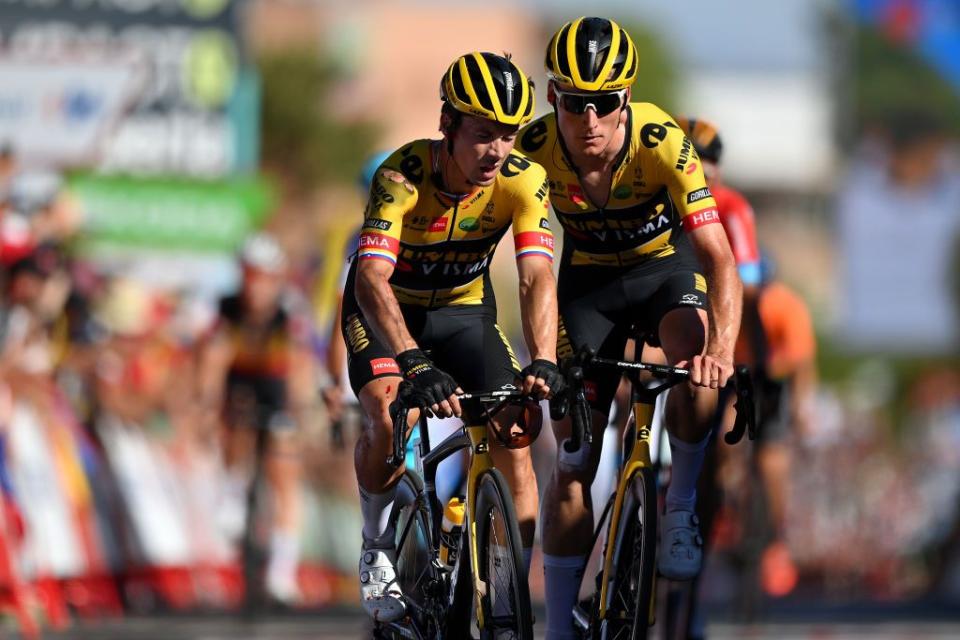
The Vuelta’s final week began with Stage 16, a tricky stage with a punchy finish in Tomares that proved to be the Vuelta’s most dramatic day. After gaining time on Evenepoel on the previous weekend’s two summit finishes, Slovenia’s Primož Roglič (Jumbo-Visma)–who entered the day in second-place overall–attacked with a few kilometers left in the stage in a bid to catch Evenepoel by surprise. The move worked: Evenepoel was gapped, but a suspicious flat tire inside the 3km-to-go banner meant he only lost 8 seconds. (Riders are given the same time as the group they would have finished with if they crash or suffer a mechanical with few than 3km left in the race.)
At the front of the race, Roglič crashed while trying to sprint for the stage win (which went to Pedersen) and the time bonuses that came with it. He was able to get back on his bike and finish the stage, but the damage had been done: the Vuelta’s three-time defending champion would not start Stage 17 the next morning, eliminating Evenepoel’s biggest rival.
Stage 17 finished atop a Category 2 climb to the Monasterio de Tentudía. A breakaway filled with strong out-of-contention climbers and all-rounders went the distance, with Colombia’s Rigoberto Uran (EF Education-EasyPost) taking the win. The savvy veteran now has stage victories in all three grand tours, and with his contract with EF Education-EasyPost set to expire (and Carapaz joining the team in 2023) the win couldn’t have come at a better time for the 35-year-old.
Evenepoel erased any lingering doubts about his chances of defending the red jersey on Stage 18. The Belgian won the stage atop the Alto del Piornal, chasing down the breakaway’s last survivor and outsprinting Mas for the stage victory. Pedersen took his third stage victory of this year’s race the next day, winning Stage 19 in Talavera de la Reina.
Stage 20 brought the Vuelta’s final mountain showdown, with five categorized climbs through the Guadarrama Mountains outside of Madrid. Carapaz won the stage atop the Puerto de Navacerrada, matching Pedersen as the winningest rider in this year’s Vuelta. But it was the battle behind him that garnered most of the attention as Movistar and UAE Team Emirates tried–and failed–to crack Evenepoel.
Stage 21 began with champagne and photo opportunities for the riders wearing the Vuelta’s leader’s jerseys and ended with a field sprint in Madrid won by Colombia’s Juan Sebastian Molano.
But while Molano won the stage, the day’s real winner was Evenepoel, who finished safely in the peloton to take home Belgium’s first grand tour victory since Johan De Muynck won the 1978 Giro d’Italia.
What Did We Learn?
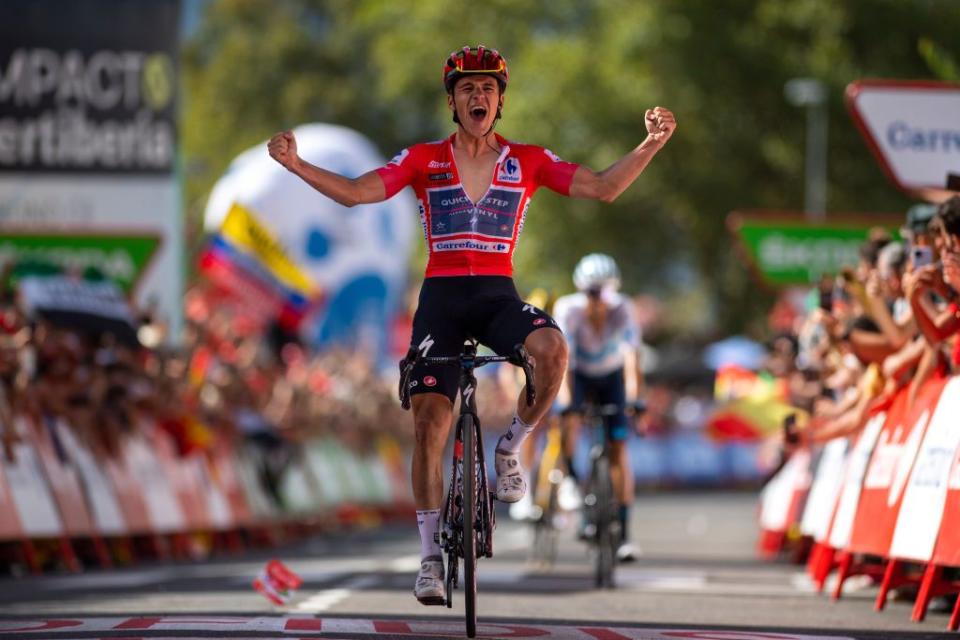
Well, a lot of people are digging into a healthy portion of crow tonight, because it appears as the hype that’s surrounded Evenepoel since he was a junior was clearly justified. Already an accomplished rider when it comes to winning one-day Classics and short stage races, Evenepoel took the next and perhaps most important step in his still-young career, by ending his nation’s 44-year grand tour drought. Heralded as Belgium’s “next Eddy Merckx” since turning professional before his 19th birthday, the kid from the Flemish town of Aalst, delivered.
To be honest, we were among those who doubted Evenepoel’s chances–especially after he lost time to Roglič and Mas on Stages 14 and 15. But he rebounded in the final week, winning Stage 18 on the Alto del Piornal to send a powerful message to those hoping to take the red jersey. And while the task was made much easier thanks to Roglič’s crash and subsequent abandon, it would be unfair to take anything away from Evenepoel and the manner in which he won the Spanish grand tour. In all he and his Quick-Step Alpha Vinyl team defended the red jersey for 15 stages, an impressive feat for anyone, let alone a rider competing in only the second grand tour of his career and a team that had never won one before.
What’s next is the biggest question: does he continue targeting a diverse program of races, or does he focus exclusively on continuing his development as a grand tour rider? In Belgium he’ll face incredibly pressure to target the Tour de France, which no Belgian has won since 1976, but that might be too tall of an order given the competition he’ll face from the likes of Slovenia’s Tadej Pogačar (UAE Team Emirates) and Denmark’s Jonas Vingegaard (Jumbo-Visma) who most would agree occupy a tier above Evenepoel in terms of their grand tour pedigree. (Not to mention the fact that Quick-Step is not a team built for sustained grand tour contention–without a bit of a roster overhaul, it’s hard to see them going toe-for-toe with UAE, Jumbo, and INEOS at a race like the Tour de France.)
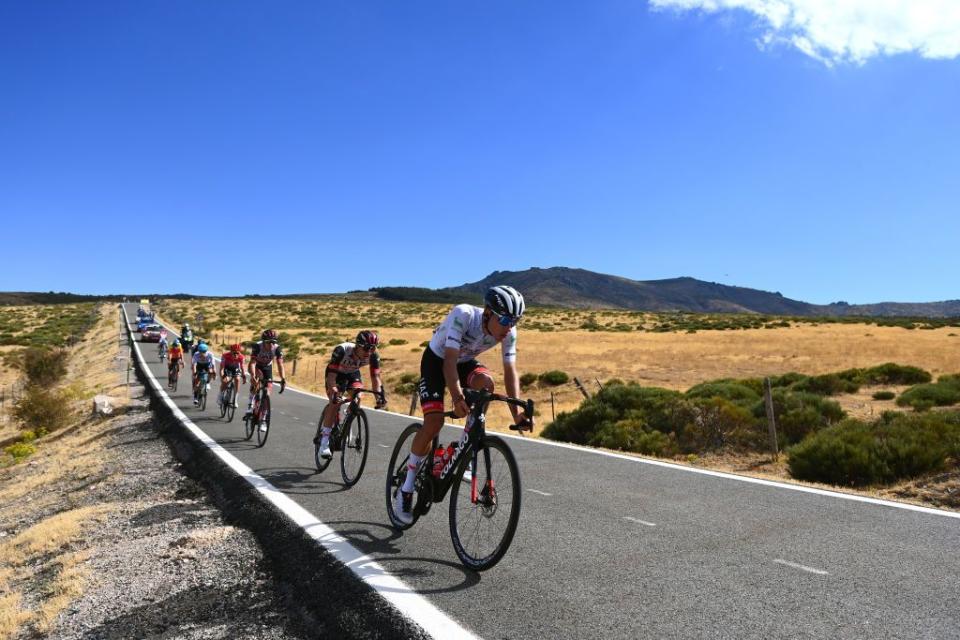
Behind Evenepoel, Mas did well to finish second for the third time in his career, possibly saving Movistar from being relegated at the end of the season. But his performance is likely overshadowed in the Spanish press by Ayuso’s third-place finish. Only 19-years-old and racing his first grand tour, Ayuso is the second-youngest rider in history to finish on the podium of a grand tour. It also reminds us of the grand tour debut of his teammate Pogačar, who won three stages and finished third overall at the 2019 Vuelta–also his first grand tour–less than a week away from his 21st birthday.
Roglič was the Vuelta’s biggest disappointment, not for the manner in which he lost the race, but more for the way in which he added insult to injury by attempting to place blame on Great Britain’s Fred Wright (Bahrain-Victorious) for causing the crash that ended his bid to win a fourth Vuelta. Releasing a press release a few days after the incident, Roglič and Jumbo-Visma looked like petulant children in the way they responded to what happened, tarnishing the image of a team and rider who have done a great job–until now–of keeping fans and the media on their side when both winning and losing. Roglič himself has now crashed out of three of the last four grand tours he’s entered, and one has to wonder if the mental toughness he’s displayed throughout much of his career is starting to falter.
What’s Next?
With a little more than a month left in the 2022 road season, all eyes will be on Wollongong, Australia which hosts the 2022 UCI Road World Championships–starting with the Men’s and Women’s Elite Individual Time Trial events–from September 18 through 25.
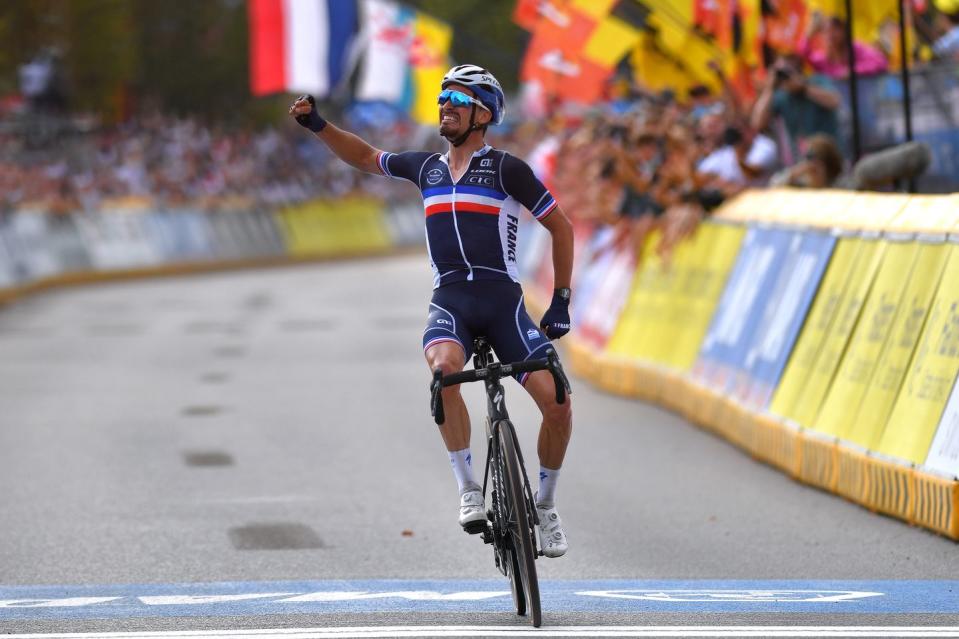
Traditionally, many riders use the Vuelta to prepare for Worlds, and we should see several riders from this year’s edition make the trip down under. First and foremost among them is Evenepoel, who might be a favorite in both the time trial and the road race (although he’s technically starting the road race in support of his compatriot Wout van Aert). But after winning the Vuelta, we won’t be surprised if he doesn’t make the trip–and if he does, expect a long series of post-Vuelta PR appearances to take a toll on his form.
We’ll see more rosters for Worlds finalized in the coming days, but one rider we know won’t be heading to Australia is Pedersen, who would be a top favorite if he were going but has instead chosen to stay closer to home. One rider who we expect will be racing is Great Britain’s Wright, who’s been scoring top-5 finishes all season and looks poised for a breakthrough.
The season ends with a series of one-day Classics that will determine which teams are relegated from the WorldTour, a fact that has lawyers from several teams putting pressure on the UCI to reconsider its plans. Mas did Movistar a major solid, essentially putting the Spanish squad in the “safe zone” for now. Lotto-Soudal and Israel-Premier Tech are currently on the outside looking in, with Team BikeExchange and Cofidis holding the last two spots. Looks for these four teams to do whatever they can to win whatever they can during the last few weeks of the season, with things possibly coming down to the wire as teams (and their attorneys) fight for their WorldTour lives.
You Might Also Like

